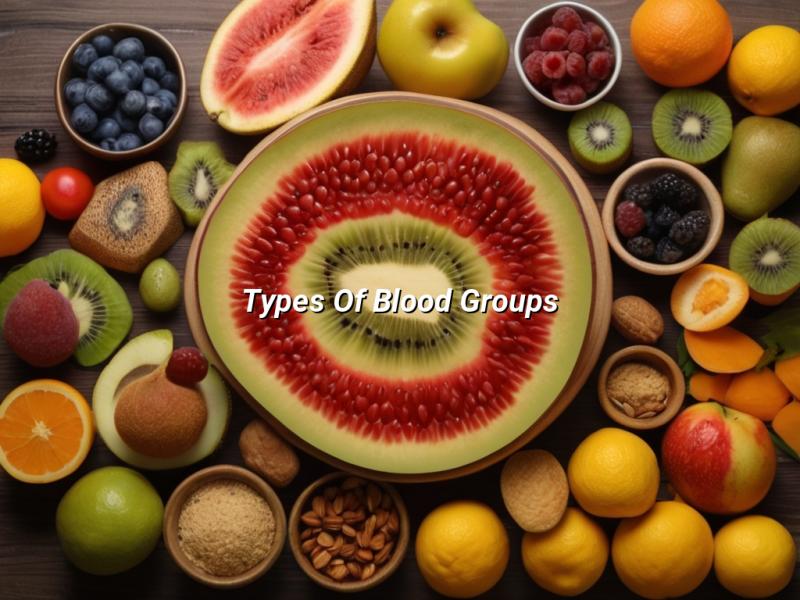Types Of Blood Groups

Exploring the Different Types of Blood Groups and Their Characteristics
Blood is a vital component of the human body, and it is essential for the proper functioning of the body’s organs and systems. Blood is composed of red and white blood cells, platelets, and plasma. The most important characteristic of blood is its type, which is determined by the presence or absence of certain antigens on the surface of red blood cells. There are four main blood groups: A, B, AB, and O.
Group A blood has the A antigen on the surface of the red blood cells. People with this type of blood are able to donate to and receive blood from other people with type A blood.
Group B blood has the B antigen on the surface of the red blood cells. People with this type of blood are able to donate to and receive blood from other people with type B blood.
Group AB blood has both the A and B antigens on the surface of the red blood cells. People with this type of blood are able to donate to and receive blood from other people with type AB blood.
Group O blood has neither the A nor B antigens on the surface of the red blood cells. People with this type of blood are able to donate to and receive blood from other people with type O blood.
In addition to the four main blood groups, there is also a fifth type of blood, known as Rh-negative. This type of blood does not have the Rh antigen on the surface of the red blood cells. People with this type of blood are able to donate to and receive blood from other people with type Rh-negative blood.
It is important to know your blood type in case of an emergency. Knowing your blood type can help medical professionals provide the best possible care in the event of a medical emergency. It is also important to know your blood type if you are considering donating blood.
The Significance of Knowing Your Blood Group Type
Knowing your blood group type is an important part of understanding your health and medical history. It is also important for medical professionals to know your blood group type in order to provide you with the best possible care.
Your blood group type is determined by the presence or absence of certain antigens on the surface of your red blood cells. These antigens are proteins that can trigger an immune response if they are not compatible with the body’s own antigens. The most common blood group types are A, B, AB, and O.
Knowing your blood group type can be beneficial in a number of ways. For example, if you need a blood transfusion, it is important to know your blood group type so that the right type of blood can be provided. It is also important for pregnant women to know their blood group type in order to determine if their baby is at risk of developing a condition called hemolytic disease of the newborn.
In addition, knowing your blood group type can help you make informed decisions about your health. For example, if you have a blood group type that is more prone to certain diseases, you can take steps to reduce your risk of developing those diseases.
Finally, knowing your blood group type can help you understand your family’s medical history. If you know your blood group type, you can look for patterns in your family’s medical history that may be related to your blood group type.
In conclusion, knowing your blood group type is an important part of understanding your health and medical history. It can also help you make informed decisions about your health and understand your family’s medical history. Therefore, it is important to know your blood group type and to keep it up to date.
The Benefits of Donating Blood According to Your Blood Group Type
Donating blood is a selfless act that can save lives. It is important to understand the benefits of donating blood according to your blood group type.
For those with type A blood, donating blood can help reduce the risk of heart disease. Studies have shown that donating blood can reduce the amount of iron in the body, which can help reduce the risk of heart disease. Additionally, donating blood can help reduce the risk of cancer. Type A blood is known to contain higher levels of certain proteins that can help reduce the risk of certain types of cancer.
For those with type B blood, donating blood can help reduce the risk of stroke. Studies have shown that donating blood can reduce the amount of iron in the body, which can help reduce the risk of stroke. Additionally, donating blood can help reduce the risk of certain types of cancer. Type B blood is known to contain higher levels of certain proteins that can help reduce the risk of certain types of cancer.
For those with type AB blood, donating blood can help reduce the risk of both heart disease and stroke. Studies have shown that donating blood can reduce the amount of iron in the body, which can help reduce the risk of both heart disease and stroke. Additionally, donating blood can help reduce the risk of certain types of cancer. Type AB blood is known to contain higher levels of certain proteins that can help reduce the risk of certain types of cancer.
For those with type O blood, donating blood can help reduce the risk of both heart disease and stroke. Studies have shown that donating blood can reduce the amount of iron in the body, which can help reduce the risk of both heart disease and stroke. Additionally, donating blood can help reduce the risk of certain types of cancer. Type O blood is known to contain higher levels of certain proteins that can help reduce the risk of certain types of cancer.
No matter what your blood group type is, donating blood can be beneficial to your health and the health of others. Donating blood is a selfless act that can save lives, and it is important to understand the benefits of donating blood according to your blood group type.
The Impact of Blood Group Type on Health and Disease
Blood group type is an important factor in determining an individual’s health and susceptibility to certain diseases. Blood group type is determined by the presence or absence of certain antigens on the surface of red blood cells. These antigens are proteins that are coded for by genes, and the four main blood group types are A, B, AB, and O.
The ABO blood group system is the most important blood group system in terms of transfusion medicine, and it is also the most studied. It is known that individuals with blood group type A are more likely to develop certain autoimmune diseases, such as rheumatoid arthritis, while individuals with blood group type O are more likely to develop certain infectious diseases, such as malaria.
In addition to the ABO blood group system, there are other blood group systems that can also affect an individual’s health. For example, the Rh blood group system is important in determining an individual’s risk of developing certain conditions, such as hemolytic disease of the newborn.
It is also important to note that blood group type can affect an individual’s response to certain medications. For example, individuals with blood group type A are more likely to experience adverse reactions to certain antibiotics, while individuals with blood group type O are more likely to experience adverse reactions to certain anticoagulants.
Overall, it is clear that blood group type can have a significant impact on an individual’s health and susceptibility to certain diseases. It is therefore important for individuals to be aware of their blood group type and to discuss any potential implications with their healthcare provider.
Understanding the Different Blood Group Types and Their Compatibility for Transfusions
Blood transfusions are a common medical procedure used to replace lost blood in a patient. In order for a successful transfusion to take place, the donor and recipient must have compatible blood types. It is important to understand the different blood group types and their compatibility for transfusions.
The most common blood group types are A, B, AB, and O. Each of these blood types is further divided into two categories, positive and negative, based on the presence of the Rh factor. The Rh factor is a protein found on the surface of red blood cells. If the protein is present, the blood type is Rh positive; if it is absent, the blood type is Rh negative.
Blood type A is the most common type, followed by O, B, and AB. Type A blood can only be given to recipients with type A or type AB blood. Type B blood can only be given to recipients with type B or type AB blood. Type AB blood can only be given to recipients with type AB blood. Type O blood can be given to any recipient, regardless of their blood type.
When it comes to the Rh factor, a person with Rh positive blood can only receive Rh positive blood, and a person with Rh negative blood can only receive Rh negative blood.
In order to ensure a successful transfusion, it is important to match the donor and recipient’s blood types and Rh factors. If the donor and recipient’s blood types are incompatible, the transfusion can be fatal.
It is also important to note that there are rare blood types, such as Bombay and Duffy, which are not compatible with the four main blood types. If a patient has a rare blood type, they must be matched with a donor who has the same rare blood type.
Understanding the different blood group types and their compatibility for transfusions is essential for successful transfusions. It is important to match the donor and recipient’s blood types and Rh factors in order to ensure a safe and successful transfusion.





